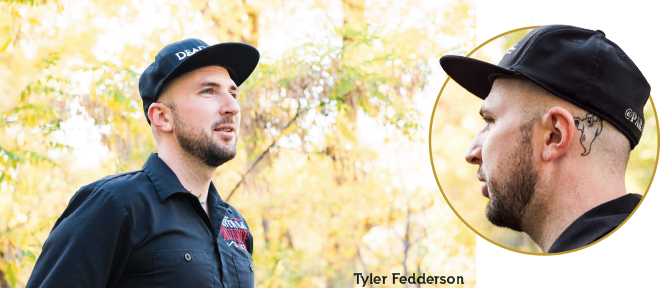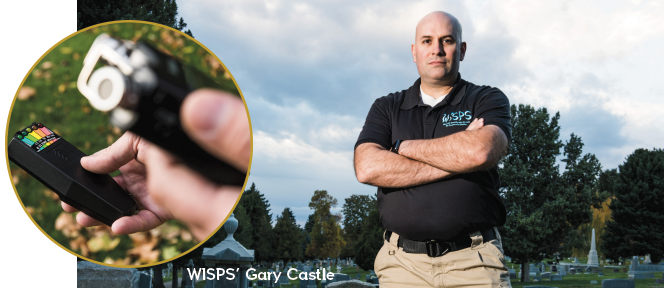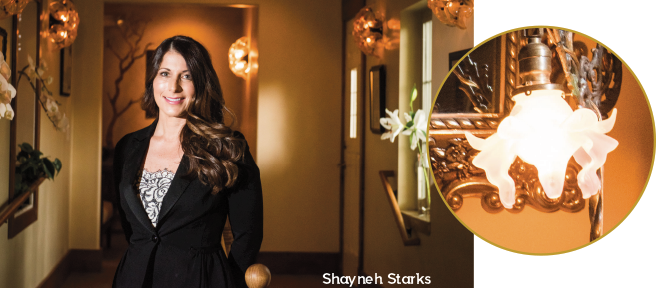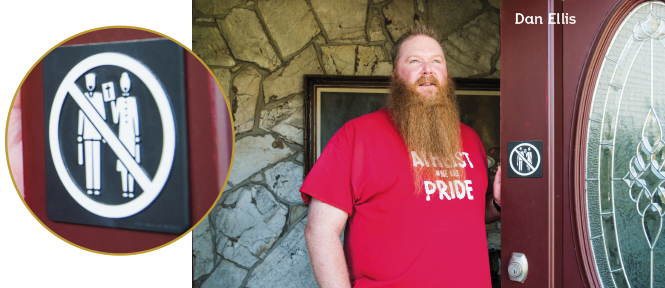
Days of the Dead
Ghostly welcome parties, chatty spirits, haunted dolls: Mediums, spirit guides and morticians tell all.
By Carolyn CampbellTyler Fedderson saw his first ghost at age 16. A neighbor asked him to watch her supposedly haunted house while she was away on a business trip. Resting after skateboarding, Fedderson and his brothers sat on the curb in front of the house. Suddenly, "an older man inside the house walked directly in front of the bay window, stared at my brothers and me and disintegrated. We all looked at each other and took off running." Later, they all agreed they saw a ghost.
Previously a skeptic, Fedderson "knew exactly what I was looking at. It was scary in the sense that I wondered what else was out there." He tried to recreate that experience and have more. He later founded Ghostface Paranormal, and started documenting ghost hunts on camera. For his second documentary, he sought a haunted doll. Researching such dolls, he found a family who wanted to get rid of a 1950s doll they claimed was haunted.
"She had gravity eyes, meaning that when she was lying down, her eyes would be closed," he says. Yet when the doll lay on a table during film production, "her eyes opened by themselves, so hard and quickly that we heard her plastic eyelids smack against her skull."
They continued filming. One night, after asking the doll to give a sign of its presence, they caught on camera a full apparition that looked like a black, shadowy mass. Scary things began happening in Fedderson's house. "A shoe went flying across the house and kitchen chairs were pulled away from the table in rage," he says. When he planned to take the doll with him to travel to paranormal events, his car wouldn't start. If he put the doll in his wife's car, it wouldn't start, either.
Fedderson says his attitude and demeanor changed, and he became reclusive. When he kept the doll in a storage unit next to his neighbors' house, they saw objects moving there. "Eventually, they asked their religious leader to come and bless their house," Fedderson recalls. He finally wrapped the doll in a towel and threw it in a dumpster, although he had heard that "if you don't dispose of haunted objects properly, they might be vengeful. I started to feel that the situation was better, but not solved. There is still a lingering presence in my house." Fedderson now believes that there is life after death. "It is ironic that I am living to find out what happens after you die," he says of his career as a paranormal investigator and filmmaker.
Death is indeed a great mystery. At any possible moment, a person can die. The scary part is they never know when—or, even scarier, how—it will happen. Throughout history, every major religion and philosophy has sought to explain the phenomenon of death. Death touches the lives of every man and woman. Rich and poor, black and white—all go to the grave. The entire human race is united under a cloud of mortality. Everyone will eventually leave the planet. But some spirits, paranormal investigators say, linger for a while.
When people see a figure standing over their bed, or they have graphically violent dreams or their kids start seeing things, they might call WISPS, the Wasatch Investigative Society for Paranormal Studies. Gary Castle, WISPS director and lead investigator, focuses on houses that people fear are haunted. He's seen full-body apparitions, had objects tossed at him and heard thousands of electronic voice phenomena (EVP). Playing back his audio recorder recently, he heard a woman's voice answering his yes-or-no questions, along with a male voice saying, "Don't tell him." He says that most ghosts are spirits of people who have passed on, and that most places have them on some level. "While spirits are usually quiet and unobtrusive, some spirits of the dead are real jerks," Castle says. "The rare spirits that have never had a body cause the most activity designed to target individuals and families and tear them apart." With the darkest spirits, "we bring out a medium to tell us why the spirit is there and what it needs." Sometimes, a long-lost loved one has already moved on, and once the spirit realizes that, the problem is resolved.
Like WISPS, Kathi Bulow of Spirit 'R' Us conducts home investigations free of charge. For everyday people facing ghosts, she advises, "Your body is your best equipment. If you walk by something and really get goosebumps and chills, it is your body's response that you shouldn't go in there." Her daughter is a medium whose abilities became apparent at 3 years old. "She recognized a picture of my mom who passed away when I was 16," Bulow says. "She started telling me things about my childhood that she never should have known." Today, her daughter assists in paranormal investigations.
Jerry Hone, founder of Paranormal U, also has no doubt that spirits exist. He takes groups on paranormal investigations with his team. "Once you are the one doing the chasing, it's empowering," he says. "Our guests who go with us are shocked to see how much fun they have." He doesn't believe in poltergeists or demons and says that his investigations at sites such as Salt Lake City's Boston Building and the Empress Theatre in Magna have yielded lots of good energy.
"When we investigated in those locations, we built a relationship with those spirits to get them to work with us well and put on presentations for customers," Hone says. "They know our intentions are good." Instead of aggressive, demanding encounters, he says, "Our focus is to find out why the spirits are there and what their purpose is in staying."
Paul Wheeler, founder of Grimm Ghost Tours, says that after communicating with spirits in a particular location, they always seem eager for his return. "Time hasn't passed by for them and it's, like, they are just waiting to continue the conversation." He says that they have told him their names, and even brought up problems they're having. One ghost at the Fear Factory site, which was housed in the Portland Cement Building, told Wheeler that his name was George Howe. Wheeler researched the name and found that a man by that name had lost his life in that building. "Doing research helps to validate some of the things we are seeing," he says. "Some spirits aren't actually telling the truth all the time, and when we research and ask questions, there's a sense of accomplishment when you find out the spirit is who you think it is. Then knowledge is passed on about that person."
Since she became a spiritual medium in 1994, thousands of people have asked Deloris Beynon to contact their dead relatives. Her customers—who range from lawyers to mechanics to doctors—all come for different reasons. "In a way, it's like a criminal investigation. Their interests are as individual as their fingerprints," Beynon says. Her clients want to put things in the past, or resolve why someone committed suicide, or they feel like somebody has a message for them and they can't quite receive it. Many are grieving the loss of a young child. "Sometimes family members who have crossed over can be guides for those who are still here," Beynon says. She is an audio clairvoyant, meaning that she sees, hears and knows the information the dead want to convey. Sometimes her clients want forgiveness from the person who died or want to make up for the hard times that they gave them. "It's very hard to lose somebody to death, especially if you are really connected," she says. Some clients visit Beynon within two weeks after a death, while others' loved ones have been gone for 10 years. She says her work is fulfilling and she has helped a lot of people. "If people are skeptical, they won't get as good a reading as someone who is open to it."
She adds that sometimes spirits don't know they are dead, or are confused about how they died. "Sometimes they don't want to go into the light because of their beliefs that they will be punished for things they have done." Beynon has seen spirits her whole life. She originally thought everyone did. She adds that if you are a medium, "a lot of people will think you are crazy, but it can run in families. My grandmother was this way and they put her in an institution." She says institutionalization happened to people who had "the gift" before it was popular or accepted, and people like Sylvia Browne appeared on TV. Still, even today, people will judge her, but she says, "It's none of my business what other people think of me."
Beynon feels she couldn't teach another person to channel spirits, but, still, everyone has a sixth sense. "The more you listen to it and find it is right, the stronger it will get." She explains that while psychics often see pictures or "little movies" relating to a person's life—mediums actually talk to the spirits. "If you see a spirit in front of you, it takes a lot of energy for that spirit to show itself to you." She says that spirits can haunt, but not all bad spirits are going to harm you. "People should fear the living a lot more than the dead." She once told a client that her own house was full of spirits. "She laughed and said, 'My husband's family runs a mortuary and we live there.'" Beynon says her gift of channeling the spirits "is my earth calling—what I came here to do. My service is to help people facilitate closing, so that they can go on with their lives."
She says that people who need her always seem to find her, and adds that spirit communication is a double-edged sword. "You see the good and the bad. I don't like to tell people when they are going to die; part of that is God's choice." She wants people to be more comfortable with spirits and not always so afraid of them. If people want to contact spirits on their own, "they should do it through meditation and prayer," she says. "Sometimes you will get a feeling that you need to call somebody and tell them that you love them. Then you get all busy with life and that person will pass away. Sometimes those feelings are like God giving us an opportunity to tell that person goodbye."
Many people have said farewell to the dead at Larkin Mortuary, which has been around since 1885. Everyone that Larkin's COO/Vice President Spencer Larkin has spoken to in the funeral industry believes in the afterlife. "When people are passing on, they call out to—and even reach out to—their dead loved ones," Larkin says. "As you grow older, you begin to accept the reality of death, yet seeing a dead body can be very hard for people." He adds that "a couple of generations back, people had seen 30 dead people by the time they were in their 20s." Today, "some people are very touchy. They hold their loved one's hand, talk to them or kiss them. Other people don't want to touch them at all. Younger people are more weirded out."
Larkin Mortuary has received bodies in every imaginable condition. "We've seen victims of car accidents, industrial accidents, burning accidents, lots of murders and suicides. People that have been isolated and haven't been found for a long time," Larkin says. He adds that even after gunshots or deformation following an accident, most bodies can be made viewable. He's heard urban legends of dead bodies moving, "but I've never known somebody to pop up because of their nerves. When we receive them, they have passed on."
When young people die tragically—from a car accident, suicide or murder, he says, "the grief is magnified greatly because it isn't natural to die at that time. It's especially hard for the parents. No matter what your age, your children are never supposed to precede you in death." He adds that at the time of such a passing, "it's important to be able to say, 'I'm sorry, this is terrible, this is tragic and I love you.'"
He says he sees coincidences that seem to be messages from the dead, "all the time, even at the funeral service. We were driving up to a cemetery up north, talking about this gentleman's Native American heritage and the symbol of the eagles. It was a beautiful day. We had just finished with the dedication. All of a sudden, we looked out and saw two eagles flying. They flew down, kind of toward us." On another occasion, a rainy day, "it seemed like no one could leave the graveside. The family was devastated and really struggling. The skies opened up and there was a double rainbow. The family said they could finally leave."
He says that being able to see your loved one is an important part of the grieving process, to recognize the reality of death. "We embalm them immediately and take special care to make them look natural and like themselves. We have a lot of techniques to beautify them. Funeral directors are amazing artists." Fifty percent of Larkin's clients come in and dress their loved ones prior to the funeral. "Nobody does that as much as we do in Utah, it's much more common with the LDS faith," he says.
He adds that, while people are often told to maintain their composure and be strong for the family, "I can't think of a better time to cry than at a funeral." He adds that everyone grieves differently and people feel myriad of emotions. "We have to go through it step by step and teardrop by teardrop." He adds that dealing with the complete relationship is important. Sometimes, he says, "there is enshrinement—saying 'this person could never have done anything wrong.'" In cases when an abusive parent dies or there is a divorce, there could be "bedevilment—saying this person could never do anything right. Neither one is a true statement." Sometimes, such as when a person is 100 years old and an adult child has cared for them for years, "the relative will feel relief, followed by overwhelming guilt. It's OK to deal with the whole relationship," Larkin says. Other times there is family estrangement, or thoughts of foul play—thinking one family member murdered another. "One of the best skills a funeral director can have is to help people communicate in a way that is appropriate, to put things on the shelf for the time being," Larkin says.
Shayneh Starks, owner of Starks Funeral Parlor, hosts many celebrations of life. "For a lot of people, it doesn't resonate to have a sit-down funeral service," she says. "Many people say they are not religious and the typical format of speaker, speaker, song doesn't resonate with them." She describes celebrations of life as a nurturing, a coming together and capturing of love. "We are breaking bread, eating, drinking, laughing and crying. It is like the rehearsal dinner before the wedding."
Starks and her husband moved to Utah from San Francisco, where there is much cultural diversity. As Catholics, they initially thought they would be the alternative funeral home. "We thought that LDS people probably wouldn't come to us, but I was wrong. We've been honored to care for very prominent LDS family members. We've had bishops recommend us and say, 'You should come here and have a celebration of life.'" She adds that some people, "in their solid faith, will say, 'I know I will see this person again' and it's a beautiful comfort. Others want us to show a scientific film and say 'please don't mention Jesus; no praying.'"
Starks says, "I'm Catholic—part of me will say I believe in the afterlife and eternity, yet as a critical thinker, I don't presume to say I know exactly what that looks like." Still, she's seen her share of signs and coincidences. She recalls a woman who came in when her mother died. Starks told the daughter, "'Your mom has great legs.' We were joking and laughing about that and she started telling me stories about her mother's legs." At another service two years later, the same woman approached Starks. She told her about a Las Vegas medium who called her up on stage, saying she had a message from her mom. It was, "I was so pleased that day when you were with the mortician. She made me laugh about how she wanted my legs." Starks adds, "My gosh, how does that happen? A medium in Las Vegas?"
When a family who was planning a funeral brought out their mother's journal to choose a verse to be read at the service, Starks smelled a strong waft of gardenias. She asked if the mother wore gardenia perfume. "No, but she loved gardenias," the family said, taking it as a sign that they needed to add gardenias to the funeral flowers.
Starks' father, it turns out, loved praying mantises. One day, when she had been thinking about him and was leaving her house, she walked outside and saw a praying mantis. She adds, "My husband's little brother passed away tragically. We thought of the symbol of a feather, kind of symbolizing our feelings for him. One night, I had a dream about him, and the next day, there was a feather on a chair in our chapel. People all have their stories of moments when they feel like their loved one is there. I hope it's true."
In her 20 years as a mortician, she says, "it's just crazy the number of times that I've heard people say that their loved one's room was filled with everyone who died before, to help escort them over. I've been in rooms where the person who is dying will look right past their family and start talking to their husband or wife who died 20 years ago."
Stark says she lives and works in an interesting vortex, a place of transition. "Families will come in and you get the sense that their loved one is is teetering between two worlds. It's hard to deny some validity," yet she also says she's read the scientific books claiming that the idea of seeing or communicating with dead loved ones near the time of one's own death, is a chemical release in the brain, and that communication with the dead isn't real. "There are two sides. We really just don't know."
As a skeptic, Dan Ellis, regional director in Utah for American Atheists, finds the concept of ghosts to be very strange. He recently posted online 13 questions (because 13 is "spooky") regarding ghost-related issues. Why are ghosts never naked, Ellis asks. With the knowledge that 99.9 percent of species no longer inhabit the earth, why do we only see ghosts of existing species? Why are there no T-rex ghosts? Why are ghosts so picky about who they reveal themselves to? Do they have social anxiety issues? "If they need to deliver a message, why don't they walk right up to the camera?" Ellis asks.
While he clarifies that atheist beliefs about the afterlife vary, he prefers to "find evidence in the things I choose to believe or not. I haven't seen any good evidence to support the notion of an afterlife." On Halloween, "there is nothing supernatural and nothing to be afraid of."
Starks says she is going out on a limb by saying, "I've heard enough stories that whatever happens after life, I definitely believe that we go to a place of love, life and happy feeling. The things that matter here don't matter any more. In this place of full understanding and complete knowledge, there is an overwhelming sense of love, light, joy and just contentment. Grudges aren't being held and there aren't unresolved issues." She continues, "People come in and say they dreamed about their family member, who told them they wouldn't come back if they could. As soon as they feel that this warm happy life is taking them away, they go."
More by Carolyn Campbell
-
Dating counselors help singles move past relationship hiccups and get to the next date.
Looking for Love
- Feb 7, 2024
-
How DNA experts and law enforcement uncover hidden identities.
Written in Bone
- Jan 24, 2024
-
City Weekly's year-end guide to getting through the holidays and closing out those Christmas lists.
Gift Guide 2023
- Dec 6, 2023
- More »
Latest in Cover Story
Readers also liked…
-
Forget the family pedigree—Robert F. Kennedy Jr should not be the next president of the United States
Trojan Horse
- Jun 21, 2023
-
Women decry harassment and toxic culture at St. George auto dealership
Men at Work
- Oct 11, 2023











